The 28 books everyone should read at least once
25 Books Everyone Should Read at Least Once in a Lifetime
If you have been raised with the conception that reading is not cool, then it is time to grow up and lay your hands on those classics everyone is talking about. The most famous books of all time were written by genius minds and incorporate the most valuable life lessons, most unusual situations, accurate framing of the world and all human typologies existing.
Even if you are not much of a reader, you should still read these 25 books. You won’t even notice how little time you spent on them, but you will be surprised by how much they helped you evolve.
When you are tired of this world, pick one of these books and go ahead and travel through history, time and all seven continents.
Hemingway is one of the giants of literature, and The Sun Also Rises is actually the first novel he published, and it presents raw desire and masculinity.
Although Hemingway published the book almost one hundred years ago, in 1926, it is still present in our lives due to its ability to enter our homes and hearts through authentic feelings and characters.
Adolescence is a complex phase, and each person reacts differently to its challenges. Often, teenagers fall into the trap of isolation, and their thoughts become much bigger than them. Holden Caulfield is not just one character. He represents thousands of versions of the same person, all observed through the eyes of various readers at different reread it.
Holden will be brilliant, reckless, stupid, or just another person in the crowd. It all depends on how your mind evolves and how you turn from a Holden into the person you are now.
A short novel published in 1925, The Great Gatsby is still an intense session of reading. It is, in big lines, a story about a neighbour who hosts the greatest parties, owns the most beautiful house and can manipulate anyone he encounters. The message is, however, more profound.
The book explains vices, loss, and desperate urge to fit in and gain what our heart desires most. You will learn that while money brings you power and influence will not guarantee you love and acceptance.
Do you want to learn the secrets and horrors of the war without going through the painful experience of reading long, heavy phrases that lose their sense somewhere in the middle?
Well, go find yourself a copy of Slaughterhouse-Five, and you will receive some dark stories at the price of a light read. While the book totally moves you, it is written in such a manner that it does not harm your emotions if you are a sensitive person.
The main character is Billy Pilgrim, an outsider in all the power of the world, who experiences Wold War II. We will see a funny but also sad story that aims to discourage violence.
A story that follows the evolution of a young man, The Adventures Of Huckleberry Finn was named by the critics The first Great American Novel. The book includes not only friendship and adolescence difficulties but also heavy political issues subtly mentioned in between the pages.
Even after all these years, the novel still determines young men (and women) to look for adventure and see the world with their own eyes.
We cannot imagine our lives now without the internet and media, and as hard as we try to hide it, we are all unhealthy dependent on them. Bradbury saw all the flaws that came along with television and the internet and understood that such a powerful tool in the hands of a corrupt and prone to hatred society will create unrepairable damage to all people.
In Bradbury’s dystopian world books are banned, and it is our main character’s job to burn as many as he finds. The novel makes us reflect on our new age addictions and brings into the light issues you might have ignored until now.
We love a good World War II book, especially if it can be easily read by children or teenagers, too. In this volume, you will meet Liesel, a girl that saves a book from the fire. Little did she know at that time that that was not the first book she was going to steal, as her passion for reading, or for escaping the cruel world she was living in, was rapidly growing.
Her family decides to hide a Jewish man in their basement, which brings trouble and death over them, but also creates the opportunity for a great friendship. Written from a unique perspective, the book underlines the importance of reading and how it empowers people in the weakest moments of their lives. Rebellion and resistance come in many forms, that is certain.
George Orwell raised a few controversies among readers, as he created a dystopian world that focuses on a dictatorial world built on fear, lies and terror. This world forbids love, freedom and individuality. The book aims to explain why these kinds of political regimes are a real danger to society.
They destroy every piece of humanity in a human, suppress every bit of love and acceptance. Orwell wanted to let people see what would happen if totalitarianism would take over the world, and the image was far from beautiful.
Russian authors proved to be titans of literature. Dostoyevsky, Tolstoy, Pushkin and many others have created novels for all people, building new worlds with real-life characteristics. One thing you might notice when reading a Russian book is the host of names. They are not only many but also similar.
Crime and Punishment, published in 1866, presents the story of Rodion Raskolnikov. He kills a seedy man and steals his loot to give it to those in need. Kind of like Robin Hood, if you will. Dostoevsky focuses on incredible human psychology while being a master at storytelling.
This novel is heavy! If you are not ready to read about things that bother people, then you should start preparing, because it is time to understand the feelings of those who suffered.
The Amazing Adventures of Kavalier & Clay describes the struggles of Jewish people before the Second World War, the complications of being gay in America of the same years, how were big businesses scamming the whole world. However, these stories are easy to read, as the author resorts to playful ways of telling them.
Authenticity is often the key to a great book. This book describes the life of a nerdy, overweight boy growing up in Jersey. The narrator is Yunior, a character that speaks in a street-wise style.
Diaz masters the slang, which contributes to how real the story feels. The book won a Pulitzer Prize for its genius and is still appreciated by critics.
This collection of short stories presents the Vietnam War and the men who fought in it. While reading the book, you will often catch yourself thinking if the narrative is accurate or just the author’s imagination and point of view.
However, in our opinion, these doubts do not make the book less tragic or emotional. O’Brien tries to give some sense of humanity to those we were thought to see as just war machines and criminals.
Some authors are simply putting their soul, experiences and personality into words. They are unfiltered, open as with a therapist, and this is exactly how Matthews presents herself in this novel. Samantha takes her sexual experiences and talks in a long monologue and explains how they affected her in different ways.
You will learn not only that it is okay to express your feelings regarding your love life but that there are multiple perspectives over one thing, and you are totally entitled to have your own.
One of the greatest books about the Holocaust, Maus is a graphic novel that follows the story of the author’s father, who experienced the indescribable horrors that came along with Hitler’s leading position in Germany. Spiegelman uses animals that symbolize groups of people. The Jewish people are mice, while the Nazis are, suggestively, cats.
The book is one of the most touching war novels. It goes through all WWII and a few years after it, presenting the influence the War had on Jews and their children who managed to survive.
WWI was, for a long time after it finished, a subject of discussion at parties, select dinners with influential people, or simply at work. All Quiet on the Western Front stepped up in front of this endless talk about bombs and violence, explaining that war is not something we should discuss or be proud of.
It is not a subject that should be brought up while eating, playing board games or working. Every horror that happened during the war is related to someone’s life, and it is not exciting or fun. It is tragic. The book underlines how bad the war is and reminds people of the miserable conditions soldiers lived in for months.
This book’s action happens in a mental asylum, where the sick male revolt against oppressive hospital workers. The patients know that the story will not end happily for everyone, but they choose to rebel anyway, to regain at least a part of their freedom.
Ken Kasey wants to transmit the value of identity and the worth of owning yourself and he’s definitely done it right.
This book is more than what schools present to the students. It is not just Greek history and mythology, but also a violent narration, with detailed descriptions of mutilated people, abuse, and sexual contact. The Gods, monsters, or even people themselves punish other people in brutal ways.
The book presents the power of mermaids that attract men with their voices into the crawls of death. The truth is this is not a children book, and it should not be given to kids at such a young age to read. However, an adult or even a young person would most likely enjoy the story, as it is a brilliant book that teaches lessons of history and how Greek used to see things at the beginning of their existence.
This book appeared, believe it or not, over 2,500 years ago, and it is a masterpiece everyone uses. Sun Tzu was the first author to create such a complex book about military strategy. It helped armies and soldiers all over the world to become more intelligent in their plans, and it reminded people that an army takes more than just muscle.
Even if you do not plan on enrolling, this book will still teach you valuable lessons about life, and most of the reach people and intellectuals you see today have read this book.
When you hear the name Charles Dickens, you will not automatically think of this book, as it is an underrated piece of this amazing English author.
This is one of the most useful novels to read in times of economic difficulty and in a world of intolerance that holds people behind.
Joyce is unlike any author on the list. He is so much harder to read and understand, and you will definitely need help with some of his paragraphs.
This novel explores the secrets of Dublin in the early 20th century, while also being the door opener to Joyce’s other books that are even more difficult to elucidate.
Tolkien is one of those people you must have heard of, even though you are not into reading. That is because his famous trilogy turned into famous movies that amazed everyone with their special effects and beautiful images. Middle Earth has almost as much history as our world, which is fascinating. Imagine that only one person was able to create such a story, while for our Earth it took billions of people.
The book teaches you the history of a fantastic world, where there are not only us, humans, monotonous creatures, but also elves, hobbits, dragons, wizards, and so many other beings. Once you open this book, you become part of that history, and it is most certainly beautiful.
Who would have thought that a Bronte would make it so high on our list? The truth is that what makes us root for this book is its immeasurable capacity to create not only a love story but a detailed analysis of the human mind and emotions. The novel shows the dark side of love, the bright side of hatred, and proves that humans are imperfect beings, destined not only for success but also for failure.
Emily Bronte follows the story of Catherine and Heathcliff, two people who would have ended the world to be together, but somewhere along the process, they ended themselves. It is a book of great passion and eagerness, a masterpiece that you can hardly compare to any other book.
Anne Frank was not a usual teenage girl. She was curious, adventurous, and, unfortunately, one of the Nazis’ victims during WWII.
As she was hiding from the German soldiers, this girl wrote each experience in her journal, which was later published by her father, one of the few survivors of the Holocaust. While living a nightmare, Anne still believes in kindness and love. You will adore her!
This book is not fiction. The author invented nothing from what you will read in this novel. Capote used his talent to present to the world the tragic story of the Clutters, who were brutally murdered in their house in 1959. The author follows the murderers’ steps and describes the efforts of capturing them, and finally, their execution.
The author tries to go deep inside the criminals’ minds and understand the reason behind their actions. In Cold Blood is, besides a true-crime story, a fine analysis of the human psyche. Capote received help from one of his dearest friends, Harper Lee, who travelled with him during the investigations. They even made a movie after the book. That is how big of an impact it had on people’s lives.
The first book on our list is a masterpiece published in 1960, To Kill a Mockingbird. The book analyses the human function and the collective behaviour of The Deep South, back at the beginning of the 20th century. The book presents humorously the flaws of society, including and not limited to hatred, prejudice and corruption.
The most controversial subject of the book is the way people used to perceive races. It is honestly terrifying to see how so many of those issues active back then are still present in today’s world. After reading this book, you will notice that we have not made considerable progress since the 30s.
Final Thoughts
Books are part of society, of the world as we know it. They are inexhaustible sources of knowledge, experience and lessons. If you don’t read, you miss the chance to walk around the world for free without leaving the comfort of your home.
If you are not a great reader, we recommend that you start with the books that seem easier on the list and then, after gaining some experience, you can move on to the complexities of the list (Dostoevsky, Joyce, Dickens, etc.).
**Luxatic is reader-supported. When you buy through links on our site, we may earn an affiliate commission.
500 Books That Everyone Should Read At Least Once
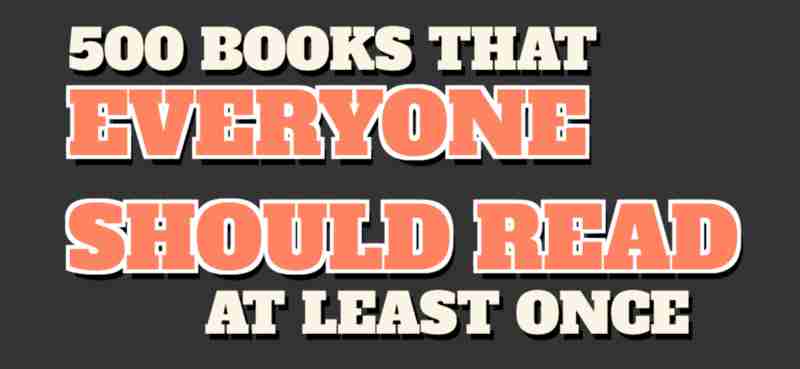
1. To Kill a Mockingbird by Harper Lee
2. Harry Potter and the Sorcerer’s Stone (Harry Potter, #1) by J.K. Rowling
3. 1984 by George Orwell
4. Pride and Prejudice by Jane Austen
5. The Diary of a Young Girl by Anne Frank
6. Animal Farm by George Orwell
7. The Hobbit by J.R.R. Tolkien
8. The Little Prince by Antoine de Saint-Exupéry
9. The Great Gatsby by F. Scott Fitzgerald
10. The Catcher in the Rye by J.D. Salinger
11. The Lord of the Rings (The Lord of the Rings, #1–3) by J.R.R. Tolkien
12. Jane Eyre by Charlotte Brontë
13. Romeo and Juliet by William Shakespeare
14. The Chronicles of Narnia (Chronicles of Narnia, #1–7) by C.S. Lewis
15. The Book Thief by Markus Zusak
16. Lord of the Flies by William Golding
17. Harry Potter and the Deathly Hallows (Harry Potter, #7) by J.K. Rowling
18. The Giving Tree by Shel Silverstein
19. The Kite Runner by Khaled Hosseini
20. The Giver (The Giver, #1) by Lois Lowry
21. Charlotte’s Web by E.B. White
22. Green Eggs and Ham by Dr. Seuss
23. Little Women (Little Women, #1) by Louisa May Alcott
24. Of Mice and Men by John Steinbeck
25. Alice’s Adventures in Wonderland & Through the Looking-Glass by Lewis Carroll
26. The Hunger Games (The Hunger Games, #1) by Suzanne Collins
27. Wuthering Heights by Emily Brontë
28. Harry Potter and the Prisoner of Azkaban (Harry Potter, #3) by J.K. Rowling
29. Gone with the Wind by Margaret Mitchell
30. Night by Elie Wiesel
31. Holy Bible: King James Version by Anonymous
32. Fahrenheit 451 by Ray Bradbury
33. The Picture of Dorian Gray by Oscar Wilde
34. Harry Potter and the Goblet of Fire (Harry Potter, #4) by J.K. Rowling
35. The Adventures of Huckleberry Finn by Mark Twain
36. Hamlet by William Shakespeare
37. The Hitchhiker’s Guide to the Galaxy (Hitchhiker’s Guide to the Galaxy, #1) by Douglas Adams
38. Harry Potter and the Half-Blood Prince (Harry Potter, #6) by J.K. Rowling
39. Brave New World / Brave New World Revisited by Aldous Huxley
40. Les Misérables by Victor Hugo
41. The Alchemist by Paulo Coelho
42. Crime and Punishment by Fyodor Dostoyevsky
43. Memoirs of a Geisha by Arthur Golden
44. The Secret Garden by Frances Hodgson Burnett
45. The Cat in the Hat by Dr. Seuss
46. The Lion, the Witch, and the Wardrobe (Chronicles of Narnia, #1) by C.S. Lewis
47. The Odyssey by Homer
48. The Help by Kathryn Stockett
49. A Christmas Carol by Charles Dickens
50. Where the Sidewalk Ends by Shel Silverstein
51. The Color Purple by Alice Walker
52. The Grapes of Wrath by John Steinbeck
53. Where the Wild Things Are by Maurice Sendak
54. The Outsiders by S.E. Hinton
55. One Hundred Years of Solitude by Gabriel García Márquez
56. The Adventures of Tom Sawyer by Mark Twain
57. Ender’s Game (Ender’s Saga, #1) by Orson Scott Card
58. A Tale of Two Cities by Charles Dickens
59. A Thousand Splendid Suns by Khaled Hosseini
60. Anne of Green Gables (Anne of Green Gables, #1) by L.M. Montgomery
61. Life of Pi by Yann Martel
62. Oh, The Places You’ll Go! by Dr. Seuss
63. One Flew Over the Cuckoo’s Nest by Ken Kesey
64. The Count of Monte Cristo by Alexandre Dumas
65. Winnie-the-Pooh (Winnie-the-Pooh, #1) by A.A. Milne
66. Anna Karenina by Leo Tolstoy
67. Tuesdays with Morrie by Mitch Albom
68. Flowers for Algernon by Daniel Keyes
69. Catch-22 by Joseph Heller
70. The Fellowship of the Ring (The Lord of the Rings, #1) by J.R.R. Tolkien
71. Slaughterhouse-Five by Kurt Vonnegut Jr.
72. The Old Man and the Sea by Ernest Hemingway
73. The Scarlet Letter by Nathaniel Hawthorne
74. Frankenstein by Mary Wollstonecraft Shelley
75. Macbeth by William Shakespeare
76. Twilight (Twilight, #1) by Stephenie Meyer
77. The Handmaid’s Tale by Margaret Atwood
78. The Time Traveler’s Wife by Audrey Niffenegger
79. Lolita by Vladimir Nabokov
80. Siddhartha by Hermann Hesse
81. The Metamorphosis by Franz Kafka
82. Goodnight Moon by Margaret Wise Brown
83. The Stranger by Albert Camus
84. A Tree Grows in Brooklyn by Betty Smith
85. The Little House Collection (Little House, #1–9) by Laura Ingalls Wilder
86. War and Peace by Leo Tolstoy
87. Uncle Tom’s Cabin by Harriet Beecher Stowe
88. The Stand by Stephen King
89. Don Quixote by Miguel de Cervantes Saavedra
90. All Quiet on the Western Front by Erich Maria Remarque
91. Atlas Shrugged by Ayn Rand
92. The Qur’an / القرآن الكريم by Anonymous الله الحكيم الخبير
93. The Poisonwood Bible by Barbara Kingsolver
94. The Book of Mormon: Another Testament of Jesus Christ by Anonymous
95. Moby-Dick or, The Whale by Herman Melville
96. The Brothers Karamazov by Fyodor Dostoyevsky
97. The Good Earth (House of Earth, #1) by Pearl S. Buck
98. I Know Why the Caged Bird Sings by Maya Angelou
99. The Hiding Place: The Triumphant True Story of Corrie Ten Boom by Corrie ten Boom
100. Harry Potter and the Chamber of Secrets (Harry Potter, #2) by J.K. Rowling
101. Great Expectations by Charles Dickens
102. The Da Vinci Code (Robert Langdon, #2) by Dan Brown
103. A Wrinkle in Time (A Wrinkle in Time Quintet, #1) by Madeleine L’Engle
104. Dracula by Bram Stoker
105. The Fault in Our Stars by John Green
106. Matilda by Roald Dahl
107. The Perks of Being a Wallflower by Stephen Chbosky
108. A Clockwork Orange by Anthony Burgess
109. Harry Potter Boxset (Harry Potter, #1–7) by J.K. Rowling
110. Sense and Sensibility by Jane Austen
111. The Tell-Tale Heart and Other Writings by Edgar Allan Poe
112. The Iliad by Homer
113. Brave New World by Aldous Huxley
114. Where the Red Fern Grows by Wilson Rawls
115. The Last Lecture by Randy Pausch
116. The Princess Bride by William Goldman
117. The Declaration of Independence and The Constitution of the United States by Founding Fathers
118. The Lorax by Dr. Seuss
119. East of Eden by John Steinbeck
120. The Curious Incident of the Dog in the Night-Time by Mark Haddon
121. Watership Down (Watership Down #1) by Richard Adams
122. Catching Fire (The Hunger Games, #2) by Suzanne Collins
123. The Fountainhead by Ayn Rand
124. The Velveteen Rabbit by Margery Williams Bianco
125. Charlie and the Chocolate Factory (Charlie Bucket, #1) by Roald Dahl
126. Alice in Wonderland by Jane Carruth
127. The Lovely Bones by Alice Sebold
128. Man’s Search for Meaning by Viktor E. Frankl
129. The Five People You Meet in Heaven by Mitch Albom
130. Rebecca by Daphne du Maurier
131. A Game of Thrones (A Song of Ice and Fire, #1) by George R.R. Martin
132. The Bell Jar by Sylvia Plath
133. The Call of the Wild by Jack London
134. Perfume: The Story of a Murderer by Patrick Süskind
135. The Wonderful Wizard of Oz (Oz, #1) by L. Frank Baum
136. Angela’s Ashes (Frank McCourt, #1) by Frank McCourt
137. The Return of the King (The Lord of the Rings, #3) by J.R.R. Tolkien
138. Dune (Dune #1) by Frank Herbert
139. A Prayer for Owen Meany by John Irving
140. Love You Forever by Robert Munsch
141. Animal Farm / 1984 by George Orwell
142. A Midsummer Night’s Dream by William Shakespeare
143. The Girl with the Dragon Tattoo (Millennium, #1) by Stieg Larsson
144. The Divine Comedy by Dante Alighieri
145. And Then There Were None by Agatha Christie
146. Bridge to Terabithia by Katherine Paterson
147. The Three Musketeers by Alexandre Dumas
148. Water for Elephants by Sara Gruen
149. The Two Towers (The Lord of the Rings, #2) by J.R.R. Tolkien
150. Persuasion by Jane Austen
151. A Clockwork Orange by Anthony Burgess
152. The Prophet by Kahlil Gibran
153. The Road by Cormac McCarthy
154. The Name of the Rose by Umberto Eco
155. How the Grinch Stole Christmas! by Dr. Seuss
156. The Golden Compass (His Dark Materials, #1) by Philip Pullman
157. The Notebook (The Notebook, #1) by Nicholas Sparks
158. Jonathan Livingston Seagull by Richard Bach
159. Oliver Twist by Charles Dickens
160. The Red Tent by Anita Diamant
161. The Pillars of the Earth by Ken Follett
162. The Secret Life of Bees by Sue Monk Kidd
163. The Crucible by Arthur Miller
164. Love in the Time of Cholera by Gabriel García Márquez
165. Mockingjay (The Hunger Games, #3) by Suzanne Collins
166. The Gift of the Magi by O. Henry
167. The Boy in the Striped Pajamas by John Boyne
168. The Master and Margarita by Mikhail Bulgakov
169. Heart of Darkness by Joseph Conrad
170. Eat, Pray, Love by Elizabeth Gilbert
171. The Complete Sherlock Holmes by Arthur Conan Doyle
172. The Unbearable Lightness of Being by Milan Kundera
173. The Canterbury Tales by Geoffrey Chaucer
174. The Shadow of the Wind (The Cemetery of Forgotten Books, #1) by Carlos Ruiz Zafón
175. J.R.R. Tolkien 4-Book Boxed Set: The Hobbit and The Lord of the Rings by J.R.R. Tolkien
176. Interview with the Vampire (The Vampire Chronicles, #1) by Anne Rice
177. In Cold Blood by Truman Capote
178. On the Road by Jack Kerouac
179. Aesop’s Fables by Aesop
180. Gulliver’s Travels by Jonathan Swift
181. The Glass Castle by Jeannette Walls
182. Invisible Man by Ralph Ellison
183. Walden by Henry David Thoreau
184. Robinson Crusoe by Daniel Defoe
185. The Origin of Species by Charles Darwin
186. The Strange Case of Dr. Jekyll and Mr. Hyde by Robert Louis Stevenson
187. Sophie’s World by Jostein Gaarder
188. The Screwtape Letters by C.S. Lewis
189. Roots: The Saga of an American Family by Alex Haley
190. The Art of War by Sun Tzu
191. The Godfather by Mario Puzo
192. Candide by Voltaire
193. Watchmen by Alan Moore
194. The Time Machine by H.G. Wells
195. The Complete Grimm’s Fairy Tales by Jacob Grimm
196. The Prince by Niccolò Machiavelli
197. Go Ask Alice by Beatrice Sparks
198. Fight Club by Chuck Palahniuk
199. The Trial by Franz Kafka
200. Emma by Jane Austen
201. The Mists of Avalon (Avalon, #1) by Marion Zimmer Bradley
202. Atonement by Ian McEwan
203. The Sun Also Rises by Ernest Hemingway
204. My Sister’s Keeper by Jodi Picoult
205. Tuck Everlasting by Natalie Babbitt
206. Stranger in a Strange Land by Robert A. Heinlein
207. Three Cups of Tea: One Man’s Mission to Promote Peace … One School at a Time by Greg Mortenson
208. Beloved by Toni Morrison
209. The Tale of Peter Rabbit by Beatrix Potter
210. James and the Giant Peach by Roald Dahl
211. Leaves of Grass by Walt Whitman
212. Mere Christianity by C.S. Lewis
213. The Phantom Tollbooth by Norton Juster
214. Number the Stars by Lois Lowry
215. The Things They Carried by Tim O’Brien
216. The Constitution of the United States of America by Founding Fathers
217. Bury My Heart at Wounded Knee: An Indian History of the American West by Dee Brown
218. Divergent (Divergent, #1) by Veronica Roth
219. Middlesex by Jeffrey Eugenides
220. The Essential Calvin and Hobbes: A Calvin and Hobbes Treasury by Bill Watterson
221. The Ultimate Hitchhiker’s Guide to the Galaxy (Hitchhiker’s Guide to the Galaxy #1–5) by Douglas Adams
222. Their Eyes Were Watching God by Zora Neale Hurston
223. A Child Called It (Dave Pelzer #1) by Dave Pelzer
224. Into the Wild by Jon Krakauer
225. The World According to Garp by John Irving
226. The Autobiography of Malcolm X by Malcolm X
227. Schindler’s List by Thomas Keneally
228. The Secret Magdalene by Ki Longfellow
229. The Complete Maus (Maus, #1–2) by Art Spiegelman
230. Murder on the Orient Express (Hercule Poirot, #10) by Agatha Christie
231. The Wind in the Willows by Kenneth Grahame
232. A People’s History of the United States by Howard Zinn
233. A Little Princess by Frances Hodgson Burnett
234. A Separate Peace by John Knowles
235. The Story of My Life by Helen Keller
236. A Farewell to Arms by Ernest Hemingway
237. Peter Pan by J.M. Barrie
238. Blood River: A Journey to Africa’s Broken Heart by Tim Butcher
239. The Hound of the Baskervilles (Sherlock Holmes, #5) by Arthur Conan Doyle
240. The Shack by William Paul Young
241. A Short History of Nearly Everything by Bill Bryson
242. The Complete Fairy Tales by Hans Christian Andersen
243. The Republic by Plato
244. Looking for Alaska by John Green
245. Things Fall Apart (The African Trilogy, #1) by Chinua Achebe
246. Holes (Holes, #1) by Louis Sachar
247. Sophie’s Choice by William Styron
248. Flow Down Like Silver: Hypatia of Alexandria by Ki Longfellow
249. Blindness by José Saramago
250. Fried Green Tomatoes at the Whistle Stop Cafe by Fannie Flagg
251. Island of the Blue Dolphins (Island of the Blue Dolphins, #1) by Scott O’Dell
252. Speak by Laurie Halse Anderson
253. Madame Bovary by Gustave Flaubert
254. American Gods (American Gods, #1) by Neil Gaiman
255. The Lightning Thief (Percy Jackson and the Olympians, #1) by Rick Riordan
256. Cat’s Cradle by Kurt Vonnegut Jr.
257. The Joy Luck Club by Amy Tan
258. The God Delusion by Richard Dawkins
259. Extremely Loud and Incredibly Close by Jonathan Safran Foer
260. Eclipse (Twilight, #3) by Stephenie Meyer
261. The Tao of Pooh by Benjamin Hoff
262. A Confederacy of Dunces by John Kennedy Toole
263. The Clan of the Cave Bear (Earth’s Children, #1) by Jean M. Auel
264. Good Omens: The Nice and Accurate Prophecies of Agnes Nutter, Witch by Terry Pratchett
265. Breaking Dawn (Twilight, #4) by Stephenie Meyer
266. Tess of the D’Urbervilles by Thomas Hardy
267. Horton Hears a Who! by Dr. Seuss
268. A Brief History of Time by Stephen Hawking
269. The Raven by Edgar Allan Poe
270. Tao Te Ching by Lao Tzu
271. All Creatures Great and Small & All Things Bright and Beautiful by James Herriot
272. Paradise Lost by John Milton
273. A Light in the Attic by Shel Silverstein
274. The Jungle by Upton Sinclair
275. Nickel and Dimed: On (Not) Getting By in America by Barbara Ehrenreich
276. The Phantom of the Opera by Gaston Leroux
277. Ulysses by James Joyce
278. The Neverending Story by Michael Ende
279. New Moon (Twilight, #2) by Stephenie Meyer
280. The 7 Habits of Highly Effective People: Powerful Lessons in Personal Change by Stephen R. Covey
281. How to Win Friends and Influence People by Dale Carnegie
282. Are You There God? It’s Me, Margaret by Judy Blume
283. Guns, Germs, and Steel: The Fates of Human Societies by Jared Diamond
284. Lonesome Dove by Larry McMurtry
285. The God of Small Things by Arundhati Roy
286. Julius Caesar by William Shakespeare
287. Angels & Demons (Robert Langdon, #1) by Dan Brown
288. Never Let Me Go by Kazuo Ishiguro
289. The House of the Spirits by Isabel Allende
290. Outlander (Outlander #1) by Diana Gabaldon
291. One Day in the Life of Ivan Denisovich by Aleksandr Solzhenitsyn
292. The Iliad/The Odyssey by Homer
293. The Complete Works by William Shakespeare
294. The Foundation Trilogy (Foundation, #1–3) by Isaac Asimov
295. Zen and the Art of Motorcycle Maintenance: An Inquiry Into Values by Robert M. Pirsig
296. The Green Mile by Stephen King
297. Little House in the Big Woods (Little House, #1) by Laura Ingalls Wilder
298. V for Vendetta by Alan Moore
299. Neverwhere by Neil Gaiman
300. For Whom the Bell Tolls by Ernest Hemingway
301. Death of a Salesman by Arthur Miller
302. Wicked: The Life and Times of the Wicked Witch of the West (The Wicked Years, #1) by Gregory Maguire
303. The Elements of Style by William Strunk Jr.
304. Treasure Island by Robert Louis Stevenson
305. A Walk in the Woods: Rediscovering America on the Appalachian Trail by Bill Bryson
306. The Thorn Birds by Colleen McCullough
307. David Copperfield by Charles Dickens
308. The Guernsey Literary and Potato Peel Pie Society by Mary Ann Shaffer
309. Othello by William Shakespeare
310. The Girl Who Played with Fire (Millennium, #2) by Stieg Larsson
311. Norwegian Wood by Haruki Murakami
312. The Reader by Bernhard Schlink
313. Lamb: The Gospel According to Biff, Christ’s Childhood Pal by Christopher Moore
314. The Shining (The Shining #1) by Stephen King
315. The Importance of Being Earnest by Oscar Wilde
316. Johnny Got His Gun by Dalton Trumbo
317. The Chosen by Chaim Potok
318. Faust: First Part by Johann Wolfgang von Goethe
319. A Fine Balance by Rohinton Mistry
320. Unbroken: A World War II Story of Survival, Resilience, and Redemption by Laura Hillenbrand
321. Cry, the Beloved Country by Alan Paton
322. The Name of the Wind (The Kingkiller Chronicle, #1) by Patrick Rothfuss
323. The Communist Manifesto by Karl Marx
324. The Awakening by Kate Chopin
325. The Host (The Host, #1) by Stephenie Meyer
326. Steppenwolf by Hermann Hesse
327. The Plague by Albert Camus
328. Calvin and Hobbes by Bill Watterson
329. The Martian Chronicles by Ray Bradbury
330. Who Moved My Cheese? by Spencer Johnson
331. The Cider House Rules by John Irving
332. Room by Emma Donoghue
333. Dead Poets Society by N.H. Kleinbaum
334. The Pilgrim’s Progress by John Bunyan
335. The House at Pooh Corner (Winnie-the-Pooh, #2) by A.A. Milne
336. Common Sense by Thomas Paine
337. Beowulf by Unknown
338. Eragon (The Inheritance Cycle, #1) by Christopher Paolini
339. Much Ado About Nothing by William Shakespeare
340. The Power of One (The Power of One, #1) by Bryce Courtenay
341. Something Wicked This Way Comes (Green Town, #2) by Ray Bradbury
342. Inferno (The Divine Comedy #1) by Dante Alighieri
343. Thirteen Reasons Why by Jay Asher
344. Being and Time by Martin Heidegger
345. Shōgun (Asian Saga, #1) by James Clavell
346. His Dark Materials (His Dark Materials #1–3) by Philip Pullman
347. A Walk to Remember by Nicholas Sparks
348. The Girl Who Kicked the Hornet’s Nest (Millennium, #3) by Stieg Larsson
349. The Glass Menagerie by Tennessee Williams
350. Notes from Underground, White Nights, The Dream of a Ridiculous Man, and Selections from The House of the Dead by Fyodor Dostoyevsky
351. Life Application Study Bible: NIV by Anonymous
352. Oedipus Rex (The Theban Plays, #1) by Sophocles
353. Hatchet (Brian’s Saga, #1) by Gary Paulsen
354. Shantaram by Gregory David Roberts
355. Antigone (The Theban Plays, #3) by Sophocles
356. The Complete Poems of Emily Dickinson by Emily Dickinson
357. Native Son by Richard Wright
358. Do Androids Dream of Electric Sheep? by Philip K. Dick
359. Old Yeller (Old Yeller, #1) by Fred Gipson
360. Holy Bible: New International Version by Anonymous
361. Silent Spring by Rachel Carson
362. Kafka on the Shore by Haruki Murakami
363. Fear and Loathing in Las Vegas by Hunter S. Thompson
364. Girl with a Pearl Earring by Tracy Chevalier
365. The Art of Racing in the Rain by Garth Stein
366. Cosmos by Carl Sagan
367. It by Stephen King
368. The Idiot by Fyodor Dostoyevsky
369. The Once and Future King (The Once and Future King #1–4) by T.H. White
370. My Ántonia by Willa Cather
371. Little House on the Prairie (Little House, #2) by Laura Ingalls Wilder
372. Cloud Atlas by David Mitchell
373. The Diving Bell and the Butterfly by Jean-Dominique Bauby
374. The Sound and the Fury by William Faulkner
375. Anthem by Ayn Rand
376. Jurassic Park by Michael Crichton
377. Breakfast at Tiffany’s by Truman Capote
378. Inkheart (Inkworld, #1) by Cornelia Funke
379. From the Mixed-Up Files of Mrs. Basil E. Frankweiler by E.L. Konigsburg
380. The Complete Persepolis by Marjane Satrapi
381. City of Bones (The Mortal Instruments, #1) by Cassandra Clare
382. The Jungle Books by Rudyard Kipling
383. Mansfield Park by Jane Austen
384. Narrative of the Life of Frederick Douglass by Frederick Douglass
385. Stargirl (Stargirl, #1) by Jerry Spinelli
386. Heidi by Johanna Spyri
387. The Heart is a Lonely Hunter by Carson McCullers
388. Mrs. Dalloway by Virginia Woolf
389. The Four Agreements: A Practical Guide to Personal Freedom by Miguel Ruiz
390. The Art of Happiness by Dalai Lama XIV
391. Freakonomics: A Rogue Economist Explores the Hidden Side of Everything (Freakonomics, #1) by Steven D. Levitt
392. Waiting for Godot by Samuel Beckett
393. Twenty Thousand Leagues Under the Sea (Extraordinary Voyages, #6) by Jules Verne
394. The Thirteenth Tale by Diane Setterfield
395. The Epic of Gilgamesh by Anonymous
396. The Voyage of the Dawn Treader (Chronicles of Narnia, #3) by C.S. Lewis
397. The Bluest Eye by Toni Morrison
398. Still Alice by Lisa Genova
399. She’s Come Undone by Wally Lamb
400. Houdini Heart by Ki Longfellow
401. The War of the Worlds by H.G. Wells
402. The Magician’s Nephew (Chronicles of Narnia, #6) by C.S. Lewis
403. Marley and Me: Life and Love With the World’s Worst Dog by John Grogan
404. Pippi Longstocking by Astrid Lindgren
405. Black Beauty by Anna Sewell
406. The Wind-Up Bird Chronicle by Haruki Murakami
407. Sarah’s Key by Tatiana de Rosnay
408. I Know This Much Is True by Wally Lamb
409. The Remains of the Day by Kazuo Ishiguro
410. Harry Potter and the Order of the Phoenix (Harry Potter, #5) by J.K. Rowling
411. Fast Food Nation: The Dark Side of the All-American Meal by Eric Schlosser
412. The Purpose Driven Life: What on Earth Am I Here for? by Rick Warren
413. White Fang by Jack London
414. Middlemarch by George Eliot
415. Snow Flower and the Secret Fan by Lisa See
416. King Lear by William Shakespeare
417. Different Seasons by Stephen King
418. White Oleander by Janet Fitch
419. The Amber Spyglass (His Dark Materials, #3) by Philip Pullman
420. Around the World in Eighty Days (Extraordinary Voyages, #11) by Jules Verne
421. Northanger Abbey by Jane Austen
422. Veronika Decides to Die by Paulo Coelho
423. The Immortal Life of Henrietta Lacks by Rebecca Skloot
424. Howl’s Moving Castle (Howl’s Moving Castle #1) by Diana Wynne Jones
425. Bridget Jones’s Diary (Bridget Jones, #1) by Helen Fielding
426. To Live and Drink in L.A. by Ben Peller
427. A Time to Kill by John Grisham
428. The Omnivore’s Dilemma: A Natural History of Four Meals by Michael Pollan
429. The Prince and the Pauper by Mark Twain
430. The Memory Keeper’s Daughter by Kim Edwards
431. A Portrait of the Artist as a Young Man by James Joyce
432. The Yellow Wallpaper and Other Stories by Charlotte Perkins Gilman
433. A Wizard of Earthsea (Earthsea Cycle, #1) by Ursula K. Le Guin
434. Gone Girl by Gillian Flynn
435. The Hunchback of Notre-Dame by Victor Hugo
436. The Merchant of Venice by William Shakespeare
437. The Stinky Cheese Man and Other Fairly Stupid Tales by Jon Scieszka
438. The Power of Myth by Joseph Campbell
439. Ishmael: An Adventure of the Mind and Spirit by Daniel Quinn
440. World War Z: An Oral History of the Zombie War by Max Brooks
441. Sybil: The Classic True Story of a Woman Possessed by Sixteen Personalities by Flora Rheta Schreiber
442. The Shock Doctrine: The Rise of Disaster Capitalism by Naomi Klein
443. Harper Lee’s To Kill a Mockingbird by Harold Bloom
444. The Amazing Adventures of Kavalier & Clay by Michael Chabon
445. Cold Mountain by Charles Frazier
446. The Prince of Tides by Pat Conroy
447. On the Beach by Nevil Shute
448. The Night Circus by Erin Morgenstern
449. Like Water for Chocolate by Laura Esquivel
450. The Hunger Games Trilogy Boxset (The Hunger Games, #1–3) by Suzanne Collins
451. Ivanhoe by Walter Scott
452. I, Robot (Robot #0.1) by Isaac Asimov
453. Amelia Bedelia (Amelia Bedelia #1) by Peggy Parish
454. Breakfast of Champions by Kurt Vonnegut Jr.
455. The Autobiography of Benjamin Franklin by Benjamin Franklin
456. The Devil in the White City: Murder, Magic, and Madness at the Fair That Changed America by Erik Larson
457. The Killer Angels (The Civil War Trilogy, #2) by Michael Shaara
458. Everything Is Illuminated by Jonathan Safran Foer
459. To the Lighthouse by Virginia Woolf
460. Lady Chatterley’s Lover by D.H. Lawrence
461. The Witches by Roald Dahl
462. The Eye of the World (Wheel of Time, #1) by Robert Jordan
463. Franny and Zooey by J.D. Salinger
464. The Other Boleyn Girl (The Plantagenet and Tudor Novels, #9) by Philippa Gregory
465. The Tipping Point: How Little Things Can Make a Big Difference by Malcolm Gladwell
466. Artemis Fowl (Artemis Fowl, #1) by Eoin Colfer
467. Wonder by R.J. Palacio
468. The Satanic Verses by Salman Rushdie
469. Guess How Much I Love You by Sam McBratney
470. The Aeneid by Virgil
471. The Left Hand of Darkness by Ursula K. Le Guin
472. My Side of the Mountain (Mountain, #1) by Jean Craighead George
473. The Rise and Fall of the Third Reich: A History of Nazi Germany by William L. Shirer
474. God is Not Great: How Religion Poisons Everything by Christopher Hitchens
475. Alexander and the Terrible, Horrible, No Good, Very Bad Day by Judith Viorst
476. Illusions: The Adventures of a Reluctant Messiah by Richard Bach
477. The Trigger: Hunting the Assassin Who Brought the World to War by Tim Butcher
478. Four Great Tragedies: Hamlet / Othello / King Lear / Macbeth by William Shakespeare
479. The Five Love Languages: How to Express Heartfelt Commitment to Your Mate by Gary Chapman
480. 23337 by Stephen King
481. Snow Falling on Cedars by David Guterson
482. The Selfish Gene by Richard Dawkins
483. Don’t Sweat the Small Stuff … and it’s all small stuff: Simple Ways to Keep the Little Things from Taking Over Your Life by Richard Carlson
484. Silas Marner by George Eliot
485. The Lottery and Other Stories by Shirley Jackson
486. Infidel by Ayaan Hirsi Ali
487. Midnight’s Children by Salman Rushdie
488. Bel Canto by Ann Patchett
489. The French Lieutenant’s Woman by John Fowles
490. Cyrano de Bergerac by Edmond Rostand
491. 2001: A Space Odyssey (Space Odyssey, #1) by Arthur C. Clarke
492. The Witch of Blackbird Pond by Elizabeth George Speare
493. World Without End (The Pillars of the Earth, #2) by Ken Follett
494. Thus Spoke Zarathustra by Friedrich Nietzsche
495. The Federalist Papers by Philo-Publius
496. Journey to the Center of the Earth (Extraordinary Voyages, #3) by Jules Verne
497. A Clash of Kings (A Song of Ice and Fire, #2) by George R.R. Martin
498. The BFG by Roald Dahl
499. The English Patient by Michael Ondaatje
500. Wild Swans: Three Daughters of China by Jung Chang
Source: Goodreads
The 28 books everyone should read at least once
It's no mean feat to select a series of books everyone should read at some point in their lives. Where do you begin? How do you choose? While no list can ever really be exhaustive—or agreed upon universally—we've rounded up books we believe cover universal themes, from a range of genres by some of the best authors in the world.
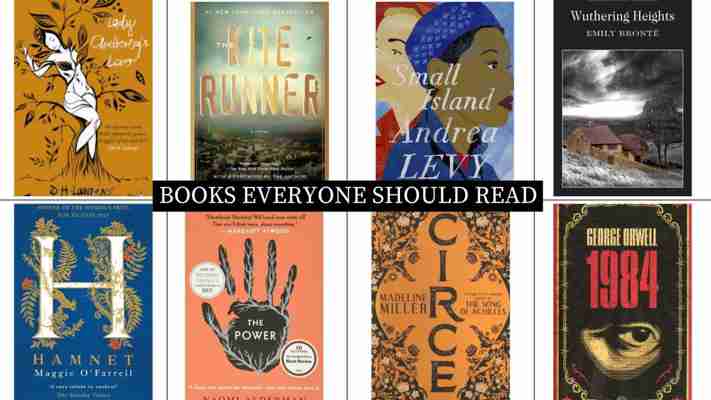
Penned by great authors, each of the novels listed here have been chosen by our expert Books Editor. You'll find many of the best historical fiction books, as well as best thriller books, sweeping love stories, and gripping dystopian reads—there is something for all preferences. All will that move you, challenge you, and thrill you, regardless of whether they were written in 1813 or 2022. So whether you're committed to reading paperbacks, or prefer using one of the best eReaders, here are the 28 books we reckon everyone should read.
28 books everyone should read
Love and romance
Love stories speak to us all on some level, because relationships—in all their beauty, complexities, messiness, and joy—are part of all of our lives. Each of these romantic novels made it onto our list because they look at love with a piercing, unflinching, and (in some cases) humorous gaze.
(opens in new tab) Pride And Prejudice by Jane Austen Love stories do not come more brilliantly observed, more entertaining or more joyful than that of the wry and prejudiced Elizabeth Bennet and the stern and proud Mr Darcy. As with all of Austen’s works, it is the author’s wit, charm and intelligence that reels the reader into the lives of her flawed-yet-lovable characters. The enduring popularity of 1813 novel means it's become the archetype for many other stories based upon matters of the heart. To read it is to love it, which is why it's one our of books everyone should read and one of the best romance books (opens in new tab) of all time.
Pride and Prejudice by Jane Austen at Amazon for £5.24 (opens in new tab)
(opens in new tab) Wuthering Heights by Emily Bronte Oozing with atmosphere, this dark and intense gothic romance follows Cathy and Heathcliff, who meet as children when the former’s father takes in the young boy. They spend their youth traversing the wild moors, exploring, growing up, and eventually falling in love. When life conspires to tear the couple apart, however, it is not simply their own lives that will end up devastated. As a love story, it’s undoubtedly brutal, but there is a majesty to its unashamed wildness, to Brontë’s poetic storytelling, and to the idea of a shared emotion being so potent that it has the power to destroy everything else in its path.
Wuthering Heights by Emily Bronte at Amazon for £0.99 (opens in new tab)
(opens in new tab) I Capture The Castle by Dodie Smith Long before writing One Hundred and One Dalmatians, author Dodie Smith wrote this witty and warm-hearted debut about a young girl growing up with her bohemian family and falling in love for the first time. Quite rightly, it became a classic, and one that deserves to be read and enjoyed multiple times. Set in the 1930s, the journal-style story chronicles the daily capers, emotions and observations of Cassandra Mortmain, who lives in a crumbling, isolated castle in the middle of the English countryside with her father, stepmother, sister, brother and Stephen, who is hopelessly in love with her. Pure unadulterated joy, and certainly one of those books everyone should read at least once.
I Capture The Castle by Dodie Smith at Amazon for £7.99 (opens in new tab)
(opens in new tab) Jane Eyre by Charlotte Bronte Orphaned in childhood and raised by a cruel aunt, it is little wonder that the eponymous heroine of this classic Victorian gothic romance novel grows up tougher than most. Having accepted the position of governess for the young ward of the brooding and sour-tempered Mr Rochester, Jane Eyre moves to the remote Thornfield Hall determined to stay the course. When her feelings for her master begin to change and the house begins to reveal its secrets, however, Jane must decide whether to stand by the man she’s grown to love, or abandon him to stay true to her own convictions. A quietly intense and powerful read.
Jane Eyre by Charlotte Bronte at Amazon for £4.49 (opens in new tab)
(opens in new tab) Persuasion by Jane Austen Ask someone which of Jane Austen’s novels is their favorite, and you will invariably hear a reply of Pride and Prejudice or Sense and Sensibility. Occasionally, Emma will win the vote—and why not? They are all wonderful stories. Less often though do you hear the merits of Persuasion being extolled, but there is so much to enjoy about Austen’s last completed work. It follows the 27-year-old Anne Elliot, who is persuaded by a friend into ending her engagement with a naval officer called Frederick Wentworth, a decision that Anne goes on to regret. When Mr. Wentworth returns from a long voyage as a prosperous sea captain, his and Anne’s lives collide once again—but will it prove too late for them to reunite romantically?
Persuasion by Jane Austen at Amazon for £1.65 (opens in new tab)
(opens in new tab) Lady Chatterley’s Lover by D.H. Lawrence First published in 1928 but banned in the UK until 1960 because it was deemed to be pornographic, you may feel obliged to approach this controversial novel with caution. Of course, the world has moved on in the intervening years, and what was once considered smut would now barely cause a ripple. The story follows an affair between Constance Chatterley and the gamekeeper on her estate. Her husband, Clifford, was paralyzed by an injury in the Great War and is now confined to a wheelchair—a situation that has resulted in a growing disconnect between the two. It is Constance’s frustration and loneliness that lead her towards gamekeeper Oliver, but what begins as a casual dalliance soon takes a darker turn.
(opens in new tab) Lolita by Vladimir Nabokov This is not a romance, but we include it here because the narrator believes it is a love story. Lolita is an incredible work of fiction, but a story about a 37-year-old man pursuing with a 12-year-old girl is going to be strong stuff. However, Lolita is modern classics, and that is perhaps more to do with its conspiratorial tone—and our unavoidable fascination with the outwardly abhorrent Humbert Humbert and his obsession with Dolores “Lolita” Haze—than its troubling subject matter. You get a sense while reading that the author is playing tricks on you, urging you to keep reading so that you might be smart enough to uncover secrets. It's a ploy that proves irresistible.
Lolita by Vladimir Nabokov at Amazon for £2.04 (opens in new tab)
Fantasy and futuristic
Dystopian fiction allows to consider our society at a remove, although these days some dystopian novels can seem a little closer to life than we'd like to admit. But when you want to dive headfirst into an entirely different world, these great fantasy novels offer a fascinating escape.
(opens in new tab) 1984 by George Orwell Chilling from the opening line, Orwell’s ninth and final novel is set in the dystopian future country of Oceania, where free will, free thought and even love are forbidden. Like many, Ministry Of Truth employee Winston Smith is opposed to the regime but has so far managed to avoid detection by the Thought Police and the all-seeing eye of Big Brother. That is, until he embarks on an affair with his colleague Julia. First published in 1949, this novel is still provocative.
1984 by George Orwell at Amazon for £0.99 (opens in new tab)
(opens in new tab) The Power by Naomi Alderman When the reigning queen of dystopian fiction, Magaret Atwood herself, describes a novel as "electrifying", you're going to take notice. Published in 2017, this award-winning piece of feminist fiction (opens in new tab) considers what would happen if girls and women woke up one day with a power that makes them stronger than their male counterparts. Struggles between the genders and traditional hierarchies are pulled apart and rebuilt, but whether it's for the better—well, see how you feel when you close out the final page. A no-brainer for our books everyone should read list, and one of the best science fiction books (opens in new tab) of the last few years.
The Power by Naomi Alderman at Amazon for £6.99 (opens in new tab)
(opens in new tab) The Lion, The Witch And The Wardrobe by CS Lewis Forty-seven years before a certain boy wizard arrived to dominate the children’s fantasy book market, author CS Lewis introduced readers to a magical world every bit as exciting as the one featuring hippogriffs and Hogwarts. The Chronicles Of Narnia is a collection of seven books, but it is this, the first one published, which remains the best known and most popular. It tells the tale of four children—Peter, Susan, Edmund and Lucy—who are evacuated during wartime to a rambling mansion, where they find a hidden door to another world in the back of a wardrobe. One of the most fun books everyone should read—it's a novel that more than warrants a re-read in adulthood if you only read it as a child.
(opens in new tab) Harry Potter And The Philosopher’s Stone by J.K. Rowling No list of the books everyone should read at some point would be complete without Harry Potter. There is barely a corner of the world that remains untouched by the magical world of Harry Potter—a series of seven novels about an orphaned wizard destined to do battle with the evil Lord Voldemort. Now a cultural phenomenon that has spawned Hollywood movies, a sequel theatre show, a Wizarding World theme park, the Pottermore website and acres of merchandise, it is almost hard to fathom that it all began with the publication—and subsequent word-of-mouth success—of this book all the way back in 1997. That is, until you read it, and are instantly reminded of just how enchanting, inventive, wise, and wonderfully escapist it genuinely is. Plus, it makes for one of the best audiobooks (opens in new tab) too, read by the captivating Stephen Fry.
(opens in new tab) The Lord Of The Rings by JRR Tolkien Wizards, hobbits, dragons, talking trees, orcs, elves, trolls, dwarves and all manner of other mythical beasts and beings inhabit the colorful world of Middle Earth, where this bestselling book (opens in new tab), and the first in a trilogy of three Lord Of The Rings novels, is set. Betrothed The One Ring of power by his uncle Bilbo—who discovered it during his own quest in Tolkien’s earlier work, The Hobbit—Frodo Baggins and his band of supporters must journey from The Shire to the dark lands of Mordor in order to destroy it once and for all. A fantastical adventure created by a genius mind.
(opens in new tab) Life Of Pi by Yann Martel Pondicherry born Piscine Molitor “Pi” Patel is traveling by ship with his family and a collection of animals from their now-defunct zoo when the vessel capsizes, killing everyone on board save for Pi, and a Bengal tiger called Richard Parker. The two are forced to share a raft in the Pacific Ocean for 227 days, an experience that brings into question everything that Pi thought to be true. On its surface, Life Of Pi is simply a fantasy adventure story, but take the time to consider the meaning behind Yann Martel’s beautifully crafted words and the book becomes deeply philosophical. It’s also delightfully funny, and the imagery is utterly transportive.
Life Of Pi by Yann Martel at Amazon for £5.50 (opens in new tab)
(opens in new tab) Circe by Madeline Miller Circe is born to the mighty Helios, God of the sun, and his alluring nymph wife Perse, though she seems to possess none of their power. Shunned by the world of gods, Circe seeks companionship with mortals and discovers her true calling: witchcraft. Now viewed as a threat to those who raised her, Circe is banished by her father to a deserted island, where over time she encounters all manner of mythical beasts and characters, from the Minotaur to Odysseus, and unwittingly earns herself a terrifying adversary. Soon, Circe will have to choose once and for all which world she belongs to—that of the gods who ostracised her, or the humans she has come to love. Bewitching, inventive, and completely enthralling, it’s a story in which to utterly lose yourself, and one of the best fantasy books (opens in new tab) on this list.
Circe by Madeline Miller at Amazon for £1.99 (opens in new tab)
Contemporary
Books that delve into the world around us, reflecting the times and society that we live in can have a truly powerful impact. Whether depicting lives lived around the corner or on the other side of the world, they are books everyone needs to read because they offer us food for thought and can help us gain perspective.
(opens in new tab) White Teeth by Zadie Smith Centering around two wartime friends—one English and one Bangladeshi—and their families, Smith's debut novel is filled with themes of friendship, love, war, and the relationships not only between generations but between cultures. While it takes a close and thought-provoking look at Britain's relationships with people from its former colonies, it does so with humor. The multi-award-winning book became an instant bestseller, cementing its place in must-read book lists for the past 20 years.
White Teeth by Zadie Smith at Amazon for $7.32/£5.99 (opens in new tab)
(opens in new tab) The Kite Runner by Khaled Hosseini Released in 2003, two years after the original invasion of Afghanistan, this book was a timely reminder of the complex history and culture of a place that, frankly, most of us know little about. The action in this novel begins in Kabul in 1975, just before the Russian military invasion of Afghanistan. Twelve-year-old Amir has dreams of winning the local kite-fighting tournament with the help of his friend Hassan. But neither boy knows how the events of that afternoon will alter the courses of their lives. A gripping and much-loved read, the world over—if you haven't already spent time with it, you should. It's also made it onto our list of the best books of all time (opens in new tab).
The Kite Runner by Khaled Hosseini at Amazon for £5 (opens in new tab)
(opens in new tab) The Secret History by Donna Tartt Richard has not been at the prestigious Hampden College long before he notices them; the clique, a group of rich, glamorous, and alluring Classics majors who exude magnetic energy. Drawn in by the promise of something far more tantalizing than the sad and abusive life he left behind in California, Richard tries his hardest to become part of this elite circle and, as we learn very early on, it is this that leads him directly to murder. Told in two parts, which chronicle both the events leading up to the death and what transpires afterward, this immersive tale is bewitching in its intensity, shocking in its content, and unflinching in its dissection of humanity. A literary classic that should be read by all.
The Secret History by Donna Tartt at Amazon for £5.99 (opens in new tab)
(opens in new tab) Angela’s Ashes by Frank McCourt Compassionate, grimly humorous, and with moments of such poignancy that they leave a scorch mark on your heart, this astonishing Pulitzer Prize-winning memoir tells the story of Frank McCourt. Born in Depression-era Brooklyn before traveling to his parents’ native Ireland to be raised in Limerick, Frank’s childhood is pitted with episodes of grief, illness, and extreme poverty. His mother Angela is doing her best to feed and clothe her brood, but it’s a struggle when her husband Malachy rarely works and drinks all his wages when he does. The one thing Malachy does excel at, however, is storytelling, and it is this that maintains his status as a hero in Frank’s young eyes. Despite being unflinching in its depiction of how brutal life was, the book is not presented as a cry for sympathy, and it is precisely the author’s straightforward narrative style that makes his account so utterly and completely moving.
(opens in new tab) The Outsiders by S.E. Hinton The world in which 14-year-old Ponyboy has grown up does not feel like a fair one. Having lost his parents, he guesses he is fortunate in some ways to have two older brothers—Darry and Sodapop—who are doing their best to raise him. Other “Greasers” (the term given to those from the so-called wrong side of the tracks) don’t have any support network around them other than their friends. Friendship means everything. The Greasers struggle daily against poverty, violence, and discrimination, but they also have another problem—the “Socs”—those who were born into a world of affluence and privilege. The Socs do not like the Greasers and the feeling is mutual. Clashes are inevitable. One night, however, a scuffle goes too far, a man ends up dead, and life for Ponyboy changes forever.
(opens in new tab) One Flew Over The Cuckoo’s Nest by Ken Kesey Over ten years after this genre-defying novel was published in 1962, it was still being banned from various libraries and schools up and down the length of America. Critics deemed it too shocking, too sick, and too likely to persuade young readers that a life of crime was a glamorous option. How they reached the latter conclusion is baffling, given the fate of the story’s central protagonist, McMurphy, under the tyrannical rule of Nurse Ratched. Unlike the Oscar-winning film version, starring Jack Nicholson, the book is told through the eyes of half-Indian fellow inmate Chief Bromden, who observes the power struggle playing out at the Oregon State mental hospital. Often hilarious yet profoundly moving, the novel may have its roots in harsh societal satire, but is, at its heart, a story about what it means to be human.
Crime and thriller
The demand for a gripping page-turner—one that will have you right on the edge of your seat—never fades. Luckily, the crime/thriller genre offers up nearly endless options.
(opens in new tab) Fingersmith by Sarah Waters Expertly plotted and beautifully written, Fingersmith is the story of Sue Trinder, an orphan raised in a ‘baby farm’ in Victorian London—a place that also plays host to all manner of folk living in the underbelly of the East End. One such crook is petty thief—or ‘Fingersmith’—the Gentleman, who convinces Sue to pose as a maid for a rich heiress and help him seduce and later rob her. Part love story, part riveting mystery book (opens in new tab), the novel also boasts one of, if not the, best twists in historical crime fiction, which is why it's one of our books everyone should read.
Fingersmith by Sarah Waters at Amazon for £7.99 (opens in new tab)
(opens in new tab) The Goldfinch by Donna Tartt A coming-of-age tale, with many (so many) more layers than your average teen drama, this psychological thriller was awarded the Pulitzer Prize for Fiction in 2014, which is why it has made our list of the books everyone should read. When 13-year-old Theodore Decker survives a deadly bombing that kills his mother at an art museum, he stumbles away in shock, taking with him a valuable Dutch painting called The Goldfinch (hence the title). This theft, and the subsequent inability to report it or return the work, starts a descent into a long-running web of lies. This is a hefty novel that examines the complexities of life, society, and relationships in modern-day America. One of the best book club books (opens in new tab) on this list.
Donna Tartt The Goldfinch at Amazon for £9.19 (opens in new tab)
(opens in new tab) We Begin At The End by Chris Whitaker Thirteen-year-old Duchess hasn’t had much chance of a normal childhood. With a drug-addicted mother and no father to speak of, she’s become sole carer to her six-year-old brother, Robin, and has learned the hard way to do whatever she must to survive. When the man convicted of murdering her mother’s sister is released from a 30-year jail term and arrives back in their small Californian town, Duchess makes a decision that sets off a chain of devastating events. Brutal yet beautiful, this painfully human tale cements New York Times bestseller Chris Whitaker’s status as one of the most talented authors writing today.
We Begin At The End by Chris Whitaker at Amazon for £4.28 (opens in new tab)
(opens in new tab) In Cold Blood by Truman Capote In November 1959, in the small town of Holcomb, Kansas, four members of the Clutter family were murdered. Their killers, two young men named Perry Smith and Dick Hickcock, had been given a false tip-off about a safe full of cash at the property. In the end, the men made away with less than fifty dollars, making their crime one of the most senseless and savage in US history. But what has made this case linger on in the minds of many is journalist Truman Capote’s blistering account of what happened during the trial, including his own interactions with the two murderers. Brutal and chilling, there is also an undeniable and haunting beauty to this book, which once read is impossible to forget.
In Cold Blood by Truman Capote at Amazon for £7.49 (opens in new tab)
Historical fiction
Global history is a rich source of inspiration for writers—and one that offers a specific form of escapism for avid bookworms everywhere. Whether they explore events from centuries ago, or write from more recent history, these picks are truly books everyone should read at some point.
(opens in new tab) The Book Thief by Markus Zusak Set in Germany at the start of the Second World War, this deeply affecting novel follows Liesel, who is rescuing books from the Nazis, and her family, who are hiding a Jewish fighter in the basement of their home. What makes it so remarkable is not simply the story and its impact, but the fact that the piece is narrated by Death, who is looking down on the characters and observing their actions. Haunting, extraordinary and beautifully human.
The Book Thief at Amazon for £3.49 (opens in new tab)
(opens in new tab) Hamnet by Maggie O’Farrell Winner of the 2020 Women’s Prize For Fiction and a Waterstones Book of the Year, Hamnet reimagines the life of Shakespeare’s only son, who died in 1596 aged just 11 and gave his name to one of the most celebrated plays ever written. As with all O’Farrell novels, it is bewitching, immersive and lyrical, beckoning the reader into a world that feels both vital and authentic.
(opens in new tab) The Miniaturist by Jessie Burton Inspired by the display of a dolls’ house at the Rijksmuseum, Jessie Burton crafted a tale about a young woman, Petronella Oortman, who in 1686 enters into an arranged marriage with an older man named Johannes Brandt and goes to live with him, his sister and their household staff in Amsterdam. While her husband does not seek affection from her, he does give Nella a gift—a model replica of the house in which they live—plus the funds to fill it with tiny furniture, which Nella orders from a local miniaturist. Before long, however, items begin to arrive that she has not requested, items that appear to hint at events that have yet to happen. This international bestseller is an intoxicating historical mystery that enthralls and delights in equal measure.
The Miniaturist by Jessie Burton at Amazon for £3.99 (opens in new tab)
(opens in new tab) Small Island by Andrea Levy This beautiful and moving novel was adapted for the stage, at the National Theatre in London, extending its reach far beyond the page—and the post-war period it depicts. Considered by many to be the definitive account (in fiction) of the Empire Windrush Generation, this story follows the fortunes of Gilbert and Hortense Joseph, newly arrived to London from Jamaica, and their landlady Queenie Bligh. Simultaneously heartbreaking and heartwarming, horrifying and humorous, this is 100 percent one of the books everyone should read in their lifetime.
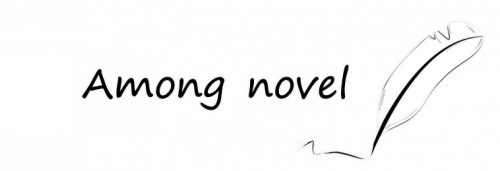
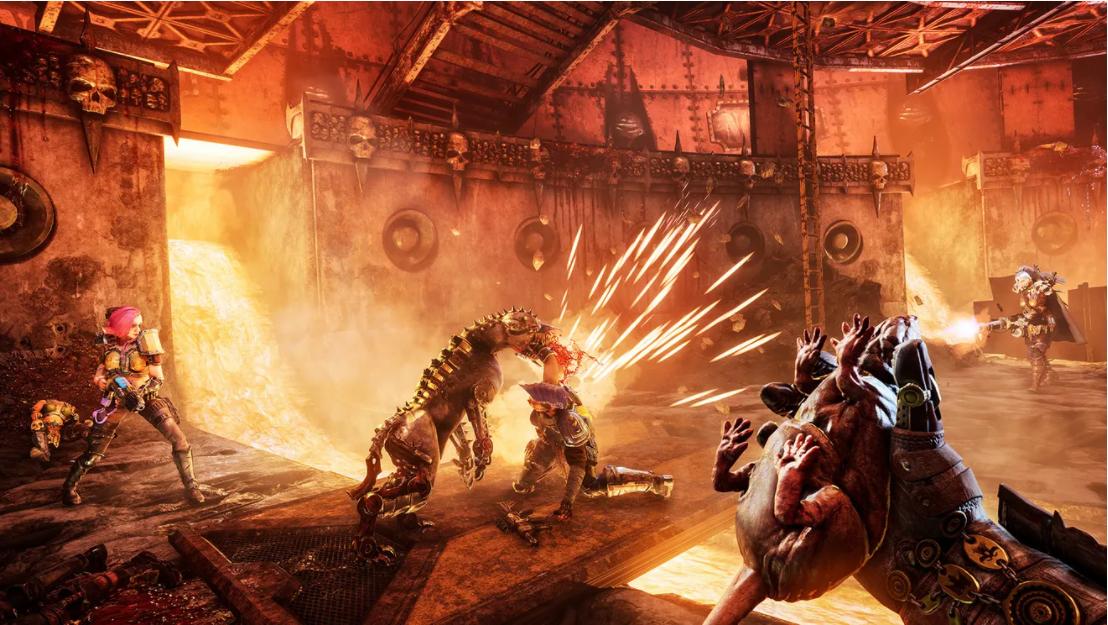
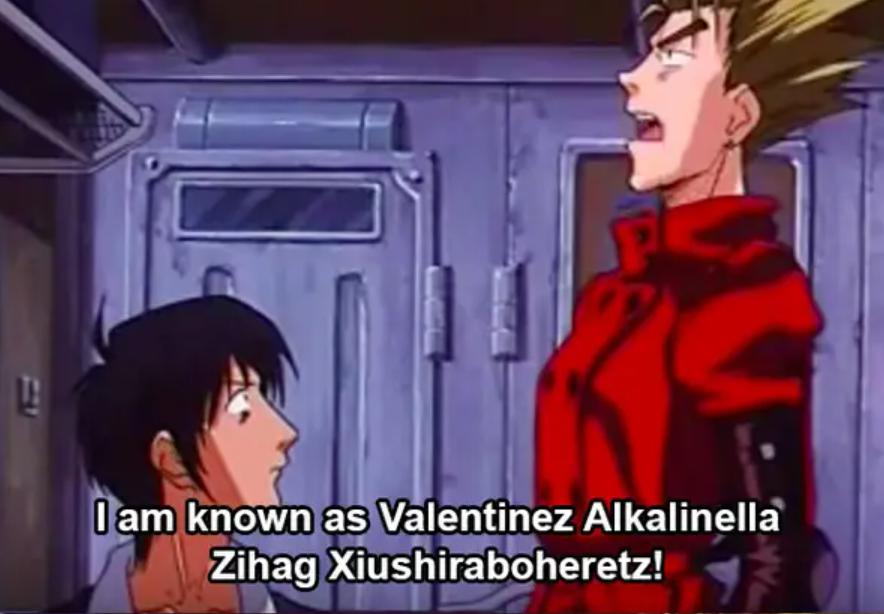
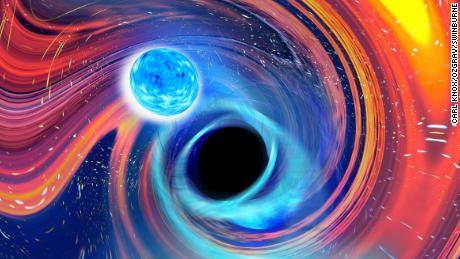


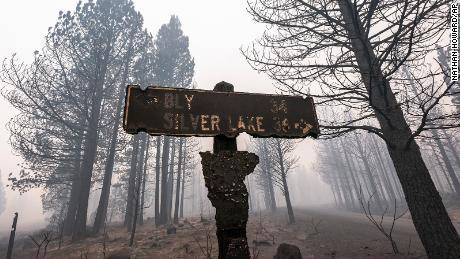




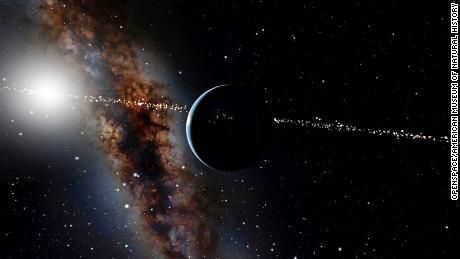
Write a Comment